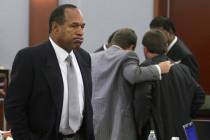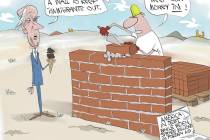The value of civil discourse
While surfing the murky Web last week, I ran across a 2004 commencement address titled "Lay Your Hammer Down" by Edwin J. Feulner of the Heritage Foundation.
I thought it a worthy reminder this holiday season of the importance of civil discourse in our great country.
Most readers don't know me personally. But if you did you'd know that few Nevadans value the marketplace of ideas more than I do. It is my faith and my life's practice to make openness and diversity of thought a core value of the Review-Journal.
But as we head into the great unknown of 2009 I must ask: Is free speech synonymous with rude behavior? Can we not argue out the important issues of the day without making it a blood sport?
Feulner began his address by recounting a 1969 Stanford experiment in which two cars were abandoned -- one in the mean streets of the Bronx and one in a rich neighborhood in Palo Alto, Calif.
Within 10 minutes the car in the Bronx was vandalized, and within a few days it was stripped and smashed to pieces.
In Palo Alto, the car sat untouched for more than a week.
The psychologist conducting the experiment then went up to the untouched Palo Alto car and took a sledgehammer and smashed part of the car. Soon, passersby took turns hitting the car with the hammer, and in a few hours the car was demolished.
Several years later two University of Pepperdine criminologists used the Stanford experiment to put forward the "broken windows" theory of crime: When a broken window in a building is left unrepaired, the rest of the windows are soon broken.
Why does a broken window invite further vandalism? It sends a signal that no one is in charge, that breaking more windows costs nothing and has no bad consequences. This phenomenon can be extended to graffiti, panhandling, littering and a host of other acts. In short, once people begin disregarding the norms that keep order in a community, both order and community quickly unravel.
As the head of a think tank in Washington, Feulner extends the "broken windows" theory to civility in public discourse. What America experiences in the marketplace of ideas, he says, is a growth of incivility not unlike the "broken windows" theory. It spreads rapidly across both ends of the political spectrum.
This incivility not only takes place in the old-guard media, but is bred at a viral rate on ubiquitous cable television "talk" shows and on the Internet, where people of questionable character vilify public figures in the most profane of ways.
You might think that's the bad moral end to the story. It gets worse.
What happens next in the "broken windows" theory is that good people begin to avoid areas of picayune crime, worrying about bigger crimes of assault and robbery. The neighborhood and the community then begin to quickly deteriorate.
So the same in the marketplace of ideas. Incivility begets greater incivility until good people back away and eventually disappear from the discussion.
We do have a First Amendment right to speak, even to speak with incivility. But it is more important than ever that good people stay in the discussion. Don't give up on the community.
As Feulner said, "Lay the hammer down."
Lay the hammer down ... good advice this holiday season. Good advice in any season.
Sherman Frederick (sfrederick@reviewjournal.com) is publisher of the Las Vegas Review-Journal and president of Stephens Media.























